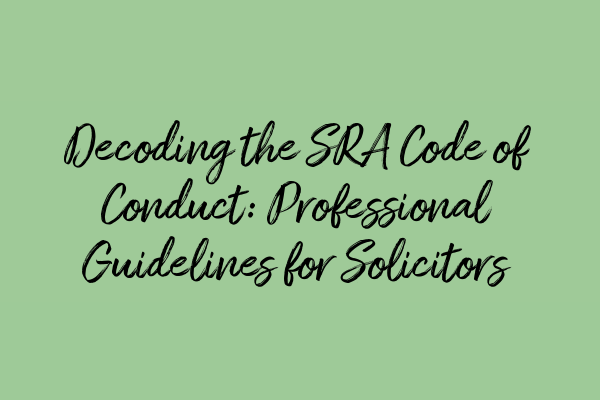Decoding the SRA Code of Conduct: Professional Guidelines for Solicitors
As a solicitor, upholding ethical standards and maintaining professionalism is of utmost importance. The Solicitors Regulation Authority (SRA) has set forth a comprehensive Code of Conduct that governs the behavior and practice of solicitors in England and Wales. In this article, we will dive deep into the SRA Code of Conduct and decode its professional guidelines.
Before we proceed, let’s take a moment to understand the significance of adhering to the SRA Code of Conduct. Compliance with these guidelines not only ensures the protection of clients’ interests but also upholds the reputation and integrity of the legal profession as a whole. It sets the standard of excellence that solicitors must strive to achieve.
Understanding the Structure of the SRA Code of Conduct
The SRA Code of Conduct is divided into two main parts: the Principles and the SRA Accounts Rules. Let’s take a closer look at each:
- The Principles: This part consists of a set of ten fundamental principles that solicitors are expected to uphold at all times. These principles include acting in the best interest of clients, maintaining the integrity of the profession, and promoting equality and diversity.
- The SRA Accounts Rules: These rules provide guidelines for managing client accounts and handling client money. They ensure transparency and safeguard against misappropriation of funds.
It is crucial for solicitors to have a comprehensive understanding of both the Principles and the SRA Accounts Rules in order to maintain professional standards and avoid any breaches.
Key Guidelines in the SRA Code of Conduct
Now, let’s delve into some of the key guidelines outlined in the SRA Code of Conduct:
1. Confidentiality
Solicitors must maintain confidentiality with respect to client information and not disclose it without proper authorization, unless required by law or for the prevention of a crime. This ensures client trust and promotes open communication between solicitors and their clients.
2. Conflict of Interest
Solicitors have an obligation to identify and avoid situations where there is a conflict between their own interests and those of their clients. It is essential to act impartially and in the best interests of the client, even if it means declining a case or referring the client to another solicitor.
3. Professional Competence
It is imperative for solicitors to maintain a high level of professional competence in their area of practice. This includes staying updated with changes in the law, undertaking relevant training, and seeking assistance when required. Continuing professional development is essential for providing quality legal services to clients.
4. Equality and Diversity
Solicitors must treat all clients and colleagues fairly and without discrimination. They should promote equality and diversity in their workplaces and ensure that their actions and decisions are not influenced by bias or prejudice.
5. Public Trust and Confidence
Solicitors play a vital role in maintaining public trust and confidence in the legal system. They must act with honesty, integrity, and transparency in all their dealings. This includes providing clear information about costs, managing client expectations, and delivering services with diligence and care.
Conclusion
Understanding and adhering to the SRA Code of Conduct is essential for solicitors to uphold professional ethics and provide quality legal services. By following the principles and guidelines set forth by the SRA, solicitors can maintain trust, integrity, and professionalism in their practice.
If you are interested in learning more about legal research skills for success in the legal profession, click here to read our article on ‘Unlocking Legal Research Skills for SQE Success’.
If you want to explore more about the SQE2 exam, click here to read our article on ‘SQE2: Everything You Need to Know About the Second Stage Exam’.
To gain insights into choosing your specialization in the legal profession, click here to read our article on ‘SQE Practice Areas: Choosing Your Specialization’.
If you are looking for strategies to succeed in re-taking the SQE, click here to read our article on ‘Re-taking the SQE: Strategies for Success’.
For a better understanding of Functioning Legal Knowledge (FLK), which is core for SQE candidates, click here to read our article on ‘Functioning Legal Knowledge (FLK): Core Concepts for SQE Candidates’.
Stay tuned for more informative articles and useful resources related to the legal profession!

Decoding the SRA Code of Conduct: Professional Guidelines for Solicitors
Comments
37 responses to “Decoding the SRA Code of Conduct: Professional Guidelines for Solicitors”
-
… [Trackback]
[…] Info to that Topic: become-solicitor-sra.co.uk/decoding-the-sra-code-of-conduct-professional-guidelines-for-solicitors/ […]
-
… [Trackback]
[…] Read More on that Topic: become-solicitor-sra.co.uk/decoding-the-sra-code-of-conduct-professional-guidelines-for-solicitors/ […]
-
… [Trackback]
[…] Read More here to that Topic: become-solicitor-sra.co.uk/decoding-the-sra-code-of-conduct-professional-guidelines-for-solicitors/ […]
-
… [Trackback]
[…] Read More here to that Topic: become-solicitor-sra.co.uk/decoding-the-sra-code-of-conduct-professional-guidelines-for-solicitors/ […]
-
… [Trackback]
[…] Information on that Topic: become-solicitor-sra.co.uk/decoding-the-sra-code-of-conduct-professional-guidelines-for-solicitors/ […]
-
… [Trackback]
[…] There you can find 88532 more Info to that Topic: become-solicitor-sra.co.uk/decoding-the-sra-code-of-conduct-professional-guidelines-for-solicitors/ […]
-
… [Trackback]
[…] Read More Info here to that Topic: become-solicitor-sra.co.uk/decoding-the-sra-code-of-conduct-professional-guidelines-for-solicitors/ […]
-
… [Trackback]
[…] Here you can find 81923 more Information on that Topic: become-solicitor-sra.co.uk/decoding-the-sra-code-of-conduct-professional-guidelines-for-solicitors/ […]
-
where buy clomiphene tablets how can i get cheap clomiphene where buy clomid pill can i purchase generic clomiphene without rx can i buy generic clomiphene no prescription clomid pills at dischem price how can i get generic clomiphene tablets
-
This website absolutely has all of the bumf and facts I needed adjacent to this thesis and didn’t identify who to ask.
-
I am actually happy to glance at this blog posts which consists of tons of of use facts, thanks for providing such data.
-
… [Trackback]
[…] There you will find 15163 more Information on that Topic: become-solicitor-sra.co.uk/decoding-the-sra-code-of-conduct-professional-guidelines-for-solicitors/ […]
-
… [Trackback]
[…] Read More Information here to that Topic: become-solicitor-sra.co.uk/decoding-the-sra-code-of-conduct-professional-guidelines-for-solicitors/ […]
-
This website exceedingly has all of the tidings and facts I needed about this case and didn’t comprehend who to ask. fildena 150 extrafuerte
-
More articles like this would pretence of the blogosphere richer. https://ursxdol.com/doxycycline-antibiotic/

Leave a Reply